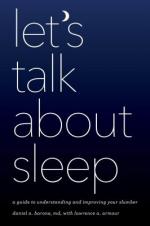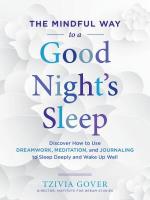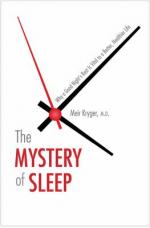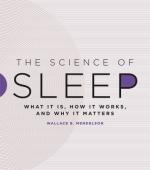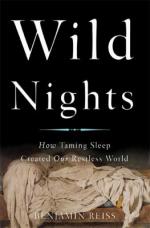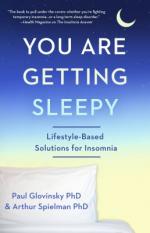March 8, 2018 | sobczakd
Are you getting enough sleep? A good night's rest is essential for our bodies to rejuvenate and re-energize. What we do during the day can impact how well we sleep at night. Many factors can keep us awake and interrupt our natural sleep tempo such as stress or too much screen time before bed. Before you catch up on some zzz's, check out these books about sleep...but stay awake long enough to read them! Want to learn more? The National Sleep Foundation's website has great tips for helping you sleep more soundly.
A good night's sleep is often taken for granted, but its lack can lead to a variety of health problems. In this accessible study, Barone, a sleep specialist, examines what is known about sleep, what can go wrong, and what you can do to to fix it. He begins with sleep hygiene tips, suggestions that include having a consistent bedtime, keeping the bedroom dark and cool, shutting off blue light devices an hour before bed, and trying meditation. He uses patients' medical histories to define sleep disorders (sleep apnea, restless leg syndrome, narcolepsy, etc.). As he analyzes their stories, Barone offers various behavioral and medical solutions. The doctor admits that medications often have side effects and that people have difficulties adapting to sleep apparatus, including CPAP (Continuous Positive Airway Pressure) machines, and experience fear of sleep testing, but he urges anyone who awakes without feeling rested to talk to a specialist. Informative without being alarming, this reassuring guide helps readers assess and take charge of their sleep issues.
Bringing her yoga and mindfulness training to shed light (or perhaps dark) on how to get a good night's rest in this 24/7, go-go-go world, the author asks us to slow down and contemplate the value and importance of how we spend one-third of our lives. Both science facts and quotes from poets lace the pages with reasons why we would want to sleep better and explore our dreams. Gover provides a linear progression of nuts-and-bolts advice on how to get to sleep, stay asleep, experience lucid dreaming, remember dreams, keep a dream journal, and wake up with a smile. It's all told with gentle prose that makes this book delightful and inspiring as well as practical.
We spend a third of our lives in bed, but how much do we really understand about what happens when we go to sleep? What s the right amount? Why do we experience jet lag? Is snoring normal? Enter Dr. Meir Kryger, a world authority on the science of sleep, with a comprehensive guide to the science of slumber that combines detailed case studies, helpful tables, illustrations, and pragmatic advice. Everyone needs sleep, and many of us will experience some difficulty sleeping over the course of our lifetimes (or know someone who does). Kryger s comprehensive text is a much-needed bedside resource for insomniacs, those who can t stay awake, and the simply curious. Uniquely wide ranging, this is part scientific history and part handbook of sleep and the disorders that affect it.
We often hear that humans spend one third of their lives sleeping--and most of us would up that fraction if we could. Whether we're curling up for a brief lunchtime catnap, catching a doze on a sunny afternoon, or clocking our solid eight hours at night, sleeping is normally a reliable way to rest our heads and recharge our minds. And our bodies demand it: without sufficient sleep, we experience changes in mood, memory loss, and difficulty concentrating. Symptoms of sleep deprivation can be severe, and we know that sleep is essential for restoring and rejuvenating muscles, tissue, and energy. And yet, although science is making remarkable inroads into the workings and functions of sleep, many aspects still remain a mystery. In The Science of Sleep, sleep expert Wallace B. Mendelson explains the elements of human sleep states and explores the variety of sleep disorders afflicting thousands of people worldwide. Mendelson lays out the various treatments that are available today and provides a helpful guide for one of life's most important activities. By offering the first scientific yet accessible account of sleep science, Mendelson allows readers to assess their personal relationships with sleep and craft their own individual approaches to a comfortable and effective night's rest.
Humans have slept since the dawn of our species. And yet the way humans sleep across history has changed dramatically, most disastrously in our own modern era. For the last two centuries sleep, the industrialized West has reduced sleep to one narrow definition: hours of unbroken slumber, in a private chamber, alone or with at most one additional partner. And this artificial cultural definition is now spreading around the world. We've gained much from this sleeping revolution--privacy and security and independence--but along the way added a whole new host of problems: the explosion of sleep disorders, sleep anxieties, and life-style diseases connected to exhaustion and sleeplessness; the devastating rise in addiction to both sleeping pills and caffeine; the nightmarish nightly-battles faced by parents enforcing artificial 'bed times' for children. Our modern world may be founded on taming sleep; and yet our collective exhaustion reveals the extraordinary costs we've all paid.
In a world where daily physical labor is increasingly rare, insomnia is rife. This title posits that, in order to sleep, you must get sleepy, and details ways to encourage sleepiness when you want it (and not when you don't). Some suggestions are familiar: don't exercise near bedtime; no caffeine after 3 p.m.; no liquor after dinner; no TV or computers in the hour before bedtime; use your bed only for sex and sleeping; etc. But the authors also go more deeply into cognitive behavioral techniques, discussing ways to adjust your internal clock, relaxation exercises, and the effects of pharmacological sleep aids. There is less emphasis on what, specifically, to do to promote sleepiness and more on the ways and whys that each strategy works or fails. Overall, this is an exhaustive study of our psychology and its physical responses, but it offers no quick fix, because there isn't one.
